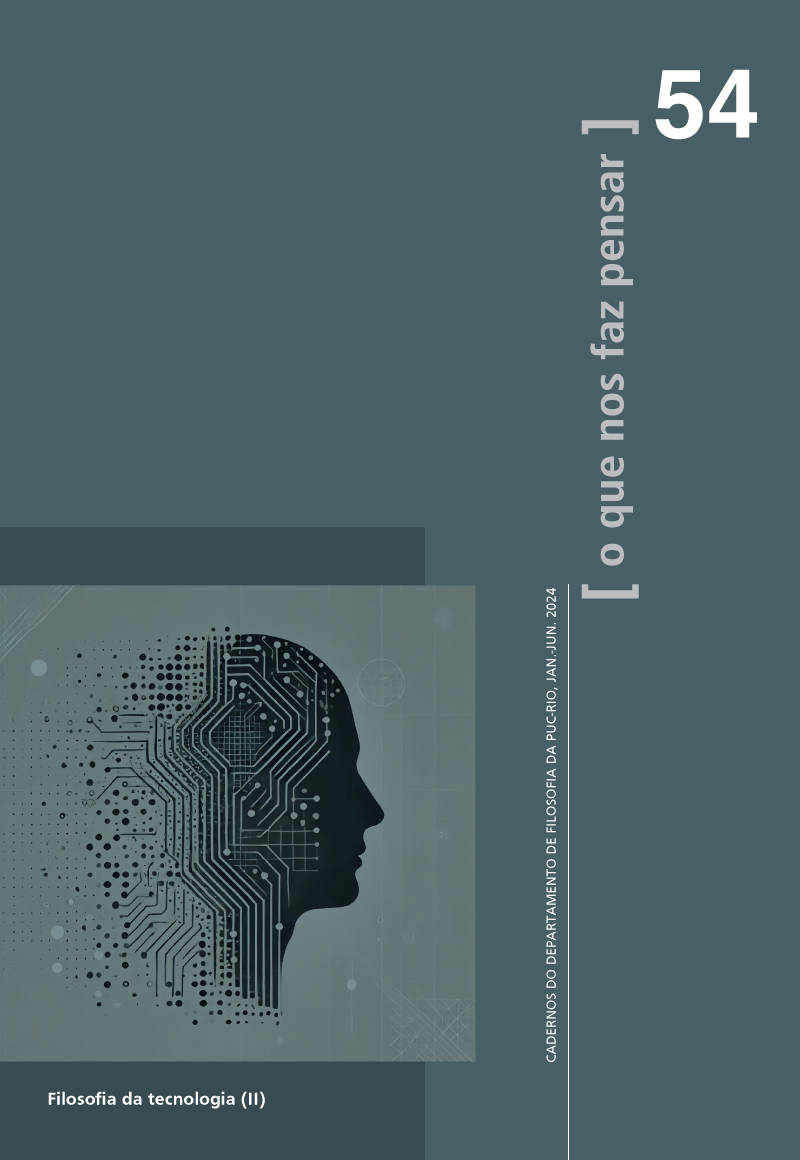Chat GPT as a Digital Iceberg – an educational approach
Main Article Content
Abstract
Teaching and research institutions received the popularization of LLMs (Large Language Models) at the end of 2022 with a mix of alarm and excitement. This article advances an interpretation and a possible reaction to the phenomenon. The hypothesis is that the ability of these devices to meet very diverse cognitive demands opens an unusual window of opportunity to rethink both the production of knowledge and the current teaching and learning practices. The prospect of accelerated and continued improvement of these technologies makes such reflection still more strategic and urgent.
Article Details

This work is licensed under a Creative Commons Attribution-NonCommercial 4.0 International License.
Copyright Notice
The author of the article or book reviews submitted and approved for publication authorizes the editors to reproduce it and publish it in the journal O que nos faz pensar, with the terms “reproduction” and “publication” being understood in accordance with the definitions of the Creative Commons Attribution-NonCommercial 4.0 International license. The article or book reviews may be accessed both via the World Wide Web – Internet (WWW – Internet), and in printed form, its being permitted, free of charge, to consult and reproduce the text for the personal use of whoever consults it. This authorization of publication has no time limit, with the editors of the journal O que nos faz pensar being responsible for maintaining the identification of the author of the article.
References
BENDER, Emily M., GEBRU, Timnit, MCMILLAN-MAJOR, Angelina, and SCHMITCHELL, Margaret. On the Dangers of Stochastic Parrots – can language models be too big? In Conference on Fairness, Accountability, and Transparency (FAccT ’21), March 3–10, 2021, Virtual Event, Canada. ACM, New York, NY, USA, https://doi.org/10.1145/3442188.3445922
CARR, Nicholas. A Geração Superficial – o que a internet está fazendo com nossos cérebros. São Paulo, Agir, 2019.
COECKELBERGH, Mark. Ética na IA, tradução de Clarisse de Souza, Edgar Lyra, Matheus Ferreira e Waldyr Delgado. Rio de Janeiro, UBU/Editora PUC, 2023.
SOUZA, Clarisse Sieckenius. Leitura Direta e Leitura Informatizada com o Voyant. EMAPS-Notas #05 10 p. Rio de Janeiro, SERG, Departamento de Informática, PUC-Rio, 2024. 10p. URL da versão impressa. http://www.hcc.inf.puc-rio.br/EMAPS/userfiles/downloads/Notas-deSouzaEstudoVoyant2024.pdf
CRAWFORD, Kate and JOLER, Vladan. Anatomy of an AI System. Share Lab and AI Now Institute, NYU, 2018.
DESMURGET, Michel. A Fábrica de Cretinos Digitais – os perigos das telas para nossas crianças. São Paulo, Vestígio, 2021.
DEWEY, John. Method in Science Teaching, General Science Quarterly, vol.1, n.1, 1916.
_______. Science as Subject-Matter and as Method, Science, jan. 28, 1910 (trad. Edgar Lyra, Ciência como Assunto e como Método, O que nos faz pensar, Rio de Janeiro, v.29, n.48, jan.-jun.2021.
DONKER, Tijbbe. The dangers of using large language models for peer review. The Lancet – Infectious Disease. Vol 23 July 2023, p.781.
EU Artificial Intelligence Act. Publicado em 12/06/2024. Disponível em https://artificialintelligenceact.eu/the-act/, último acesso em 22/10/2024.
FREIRE, Paulo. Pedagogia da Autonomia: saberes necessários à prática educativa. São Paulo, Paz e Terra, 2011.
GEFEN, Alexandre. Vivre avec le Chat GPT. Paris, L’Observatoire, 2023.
GLASS, Erin. Software of the Oppressed: reprogramming the invisible discipline. PhD Thesis. New York, Cuny University, The Graduate Center, 2018.
GRAD, Peter. Large language models prove helpful in the peer-review process. Phys. org, October 2023. Disponível em https://phys.org/news/2023-10-large-language-peer-review.html#google_vignette
HEIDEGGER, M. A Questão da Técnica. In ________. Ensaios e Conferências. Petrópolis, Vozes, 2003.
MESSERI, Lisa and CROCKETT, M. Artificial intelligence and illusions of understanding in scientific research. Nature | Vol 627 | 7 March 2024 https://doi.org/10.1038/s41586-024-07146-0
MEYER, E. T., § SCHROEDER, R. Knowledge machines: digital transformations of the sciences and humanities. Massachusetts, The MIT Press, 2015.
MONEA, Alexander. Graph Force: Rhetorical Machines and the N-Arization of Knowledge.” Computational Culture 5 (15th January 2016). Disponível em http://computationalculture.net/graph-force-rhetorical-machines-and-the-n-arization-of-knowledge/,último acesso em 22/10/2024.
OPEN AI. Disponível em https://openai.com/blog/chatgpt/, último acesso em 22/10/2024
PACHECO, Rodrigo: Senado Federal. Em tramitação. Disponível em https://www25.senado.leg.br/web/atividade/materias/-/materia/157233, último acesso em 22/19/2024.
ROCKWELL, Geoffrey and SINCLAIR, Stefan. Hermeneutica: computer-assisted interpretation in the humanities. Massachusetts, MIT Press, 2022.
SCIENCES PO NEWS 2023. Disponível em https://newsroom.sciencespo.fr/sciences-po-bans-the-use-of-chatgpt/ , último acesso em 22/10/2024.
SIMANOWSKI, Roberto. Smartphone Zombies. In The Death Algorithm and Other
Digital Dilemmas, the MIT Press, Massachusetts, 2018, p. 47-63.
VAN DIS, A. M. E., BOLLEN, Johan, VAN ROOIJ, Robert, ZUIDEMA, Willem § BOCKTING, L. Chat GPT: five priorities for research”. In Nature | Vol 614 | 9 February VAN NOORDEN, Richard. “More than 10,000 research papers were retracted in 2023 – a new record. Nature 624, 479-481 (2023).
VEE, Annette. “Full Stack Rhetoric – a response to rhetorical machines”. In JONES, John and e HIRSU, Lavinia. Rhetorical Machines – writing, code and computational ethics. The University of Alabama Press, Tuscaloosa, 2019.
ZHANG, Y., LI, Y. et al. Siren’s Song in the AI Ocean: a survey on hallucination in Large Language Models. In arXiv:2309.01219v2 [cs.CL] 24 Sep 2023.
WIKIPEDIA. Publish or perish. Disponível em https://en.wikipedia.org/w/index.php.title=Publish_or_perish&oldid=1239516132, último acesso em 22/10/2024.

